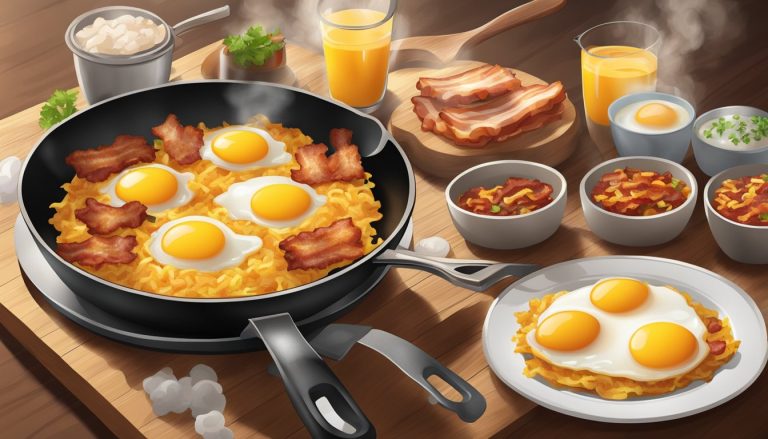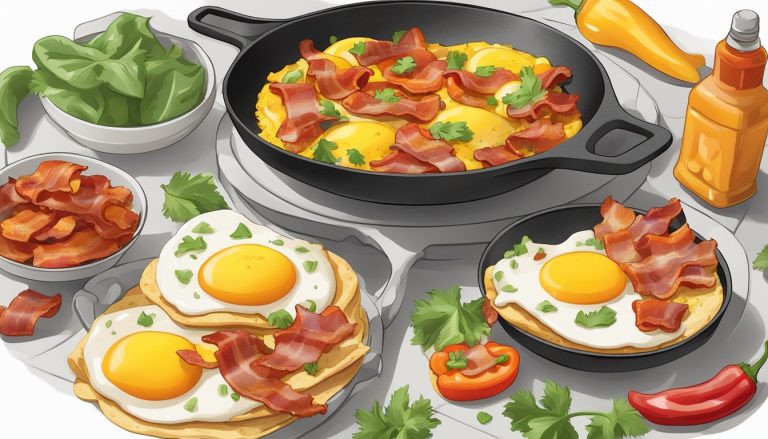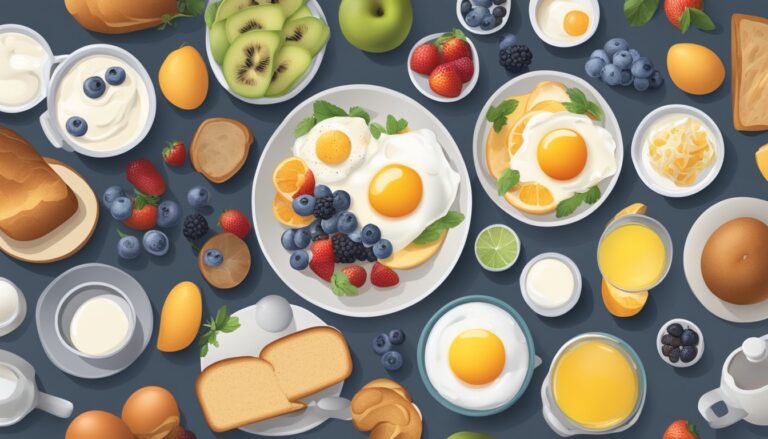Einkorn, an ancient grain with a rich history, offers a delicious and nutritious alternative for breakfast enthusiasts. This grain’s unique flavor profile and health benefits make it an excellent choice for those seeking to diversify their morning meals. Einkorn can be used in a variety of breakfast recipes, including pancakes, waffles, and porridge, often substituting cup-for-cup with whole wheat flour.
Preparing einkorn for breakfast is straightforward, though it may require some adjustments to traditional recipes. When making pancakes or waffles, the batter might need less liquid due to einkorn’s absorption properties. For a hearty breakfast, cooked einkorn berries can be prepared using a 2:1 ratio of water to grain, simmering for 30 to 40 minutes until tender.
Einkorn’s versatility extends beyond basic preparations. It can be incorporated into muffins, breakfast cookies, and even savory dishes like breakfast bowls. By exploring various einkorn recipes, home cooks can create a range of satisfying and wholesome breakfast options that harness the nutritional power of this ancient grain.
Understanding Einkorn
Einkorn is an ancient grain with unique characteristics and nutritional benefits. Its history, nutritional profile, and differences from modern wheat make it a compelling option for health-conscious consumers and baking enthusiasts.
History and Resurgence of Einkorn
Einkorn, known as the oldest wheat variety, dates back to the Neolithic period. It was one of the first grains cultivated by humans, originating in the Fertile Crescent.
Einkorn fell out of favor due to its lower yields compared to modern wheat varieties. However, it has experienced a resurgence in recent years.
The renewed interest in einkorn stems from its nutritional benefits and unique flavor profile. Many people are rediscovering this ancient grain as part of a movement towards traditional, less-processed foods.
Nutritional Values of Einkorn
Einkorn boasts an impressive nutritional profile, surpassing modern wheat in several key areas. It contains higher protein content, with about 30% more protein than modern wheat varieties.
Einkorn is rich in essential minerals such as zinc, iron, and manganese. It also provides a good source of B vitamins, including thiamin and niacin.
The grain contains significant levels of antioxidants, particularly carotenoids like lutein. These compounds contribute to its distinctive yellow color and potential health benefits.
Einkorn vs. Modern Wheat
Einkorn differs from modern wheat in several important aspects. It has a simpler genetic makeup, with only 14 chromosomes compared to modern wheat’s 42.
The gluten content in einkorn is lower and structurally different from that in modern wheat. This can make it easier to digest for some individuals with gluten sensitivities.
Einkorn flour absorbs liquid more slowly than modern wheat flour. This characteristic affects its behavior in baking, often requiring recipe adjustments.
The flavor of einkorn is described as nuttier and more complex than modern wheat. Its unique taste adds depth to baked goods and other dishes.
Health and Dietary Considerations
Einkorn offers unique health benefits and may be suitable for certain dietary needs. Its nutritional profile and digestibility set it apart from modern wheat varieties.
Benefits for Gluten Sensitivities
Einkorn contains gluten but in a different form than modern wheat. Its gluten structure is simpler and less reactive, potentially making it easier to tolerate for some individuals with gluten sensitivities.
Many people who experience discomfort with conventional wheat products report fewer issues when consuming einkorn. This ancient grain has a lower gluten content and a different gliadin-to-glutenin ratio compared to modern wheat.
Research suggests that einkorn’s protein structure may trigger less of an immune response in sensitive individuals. However, it’s crucial to note that reactions can vary from person to person.
Einkorn for Celiac Disease
Einkorn is not safe for individuals with celiac disease. Despite its different gluten composition, it still contains gluten proteins that can trigger an autoimmune response in celiac patients.
Those diagnosed with celiac disease must avoid all forms of wheat, including einkorn. The protein in einkorn can cause intestinal damage and other symptoms associated with celiac disease.
It’s essential for celiac patients to consult with a healthcare professional before considering any gluten-containing grains in their diet. Strict adherence to a gluten-free diet remains the primary treatment for celiac disease.
Digestibility of Einkorn
Einkorn is often considered more digestible than modern wheat varieties. Its genetic makeup and lower FODMAP content contribute to easier digestion for some people.
The grain’s simpler protein structure may be less challenging for the digestive system to break down. This can lead to reduced bloating and discomfort commonly associated with wheat consumption.
Einkorn’s higher antioxidant content, including lutein, may also support digestive health. These compounds can help reduce inflammation in the gut.
Soaking or sprouting einkorn before cooking can further enhance its digestibility by reducing phytic acid levels and activating enzymes.
Einkorn Flour Basics

Einkorn flour offers unique properties that set it apart from modern wheat flours. This ancient grain provides nutritional benefits and requires some adjustments when used in baking.
All-Purpose Einkorn Flour vs. Whole Wheat Einkorn
All-purpose einkorn flour is made from the endosperm of the einkorn wheat berry. It has a lighter color and texture compared to whole wheat einkorn. This variety works well in cakes, cookies, and pastries.
Whole wheat einkorn flour contains the entire wheat berry, including the bran and germ. It has a nuttier flavor and denser texture. Bakers often use it for heartier breads and muffins.
Both types of einkorn flour have a higher protein content than modern wheat. They also contain more nutrients like lutein and vitamin E.
Substitute Einkorn for All-Purpose Flour
When substituting einkorn for all-purpose flour, adjustments are necessary. Einkorn absorbs liquids more slowly, so less liquid is often needed in recipes.
A general rule is to use 3/4 cup of einkorn flour for every 1 cup of all-purpose flour called for in a recipe. Bakers may need to reduce liquids by 15-20%.
Einkorn dough should be stickier than traditional wheat doughs. Overmixing can lead to tough baked goods, so gentle mixing is key.
Rest times are important when working with einkorn. Allowing dough to rest for 30 minutes before baking helps improve texture and flavor.
Prepping Your Kitchen for Einkorn

Preparing your kitchen for cooking with einkorn flour requires specific tools and proper storage techniques. Having the right equipment and storage methods ensures successful einkorn-based meals and preserves the flour’s quality.
Tools and Equipment Needed
A well-equipped kitchen is essential for working with einkorn flour. Start with a reliable mixing bowl for combining ingredients. Glass or stainless steel bowls work well. A cast iron skillet is ideal for cooking einkorn pancakes or flatbreads, providing even heat distribution.
For baking, invest in high-quality baking dishes. Glass or ceramic dishes are suitable for most einkorn recipes. A kitchen scale helps measure ingredients accurately, as einkorn flour can be denser than regular wheat flour.
Consider purchasing a grain mill if you plan to grind your own einkorn berries. This ensures the freshest flour for your recipes.
Storing Einkorn Flour
Proper storage of einkorn flour is crucial to maintain its freshness and nutritional value. Keep einkorn flour in an airtight container to prevent moisture absorption and protect it from pests. Glass jars or food-grade plastic containers with tight-fitting lids work well.
Store the flour in a cool, dry place away from direct sunlight. A pantry or kitchen cupboard is ideal. For long-term storage, consider keeping einkorn flour in the refrigerator or freezer. This extends its shelf life and preserves its natural oils.
Label containers with the purchase or milling date to track freshness. Einkorn flour typically stays fresh for 3-6 months at room temperature and up to a year when refrigerated.
Mastering Einkorn Breakfast Recipes
Einkorn flour offers a nutritious and flavorful base for various breakfast recipes. Its unique properties require slight adjustments to traditional cooking methods, but the results are worth the effort.
Einkorn Pancakes and Waffles
Einkorn pancakes and waffles provide a hearty start to the day. To make einkorn pancakes, mix 2 cups of einkorn flour with 1 teaspoon of baking powder and 1/4 teaspoon of salt. In a separate bowl, whisk together 2 eggs, 1 1/2 cups of milk, and 2 tablespoons of melted butter.
Combine the wet and dry ingredients, stirring until just mixed. Let the batter rest for 5-10 minutes to thicken. Cook on a preheated griddle until golden brown.
For einkorn waffles, use the same batter but add an extra tablespoon of melted butter for crispiness. Cook in a waffle iron until golden and crisp.
Savory Einkorn Breakfast Bread
Einkorn sandwich bread makes an excellent base for savory breakfast options. To prepare, combine 3 cups of einkorn flour, 1 teaspoon of salt, and 1 tablespoon of yeast in a bowl. Mix in 1 1/4 cups of warm water and 2 tablespoons of olive oil.
Knead the dough for 5-7 minutes until smooth. Let it rise for 45 minutes, then shape into a loaf and place in a greased bread pan. Allow to rise again for 30 minutes before baking at 375°F for 30-35 minutes.
This versatile bread can be toasted and topped with avocado, eggs, or used for breakfast sandwiches. For a twist, try making einkorn pizza dough for breakfast pizzas.
Einkorn Muffins and Pastries
Einkorn muffins offer endless flavor possibilities. For a basic recipe, mix 2 cups of einkorn flour, 1 teaspoon of baking powder, 1/2 teaspoon of baking soda, and 1/4 teaspoon of salt. In another bowl, combine 1/2 cup of honey, 1/2 cup of milk, 1/4 cup of melted coconut oil, and 2 eggs.
Mix wet and dry ingredients, then fold in desired add-ins like blueberries or chocolate chips. Bake at 350°F for 18-20 minutes.
For a seasonal treat, try einkorn pumpkin muffins by adding 1/2 cup of pumpkin puree and pumpkin pie spices to the basic recipe. Einkorn cinnamon rolls make a delightful indulgence, using the sandwich bread dough as a base and adding a cinnamon-sugar filling.
Exploring Einkorn Recipe Variations

Einkorn pancakes and waffles offer a versatile canvas for culinary creativity. From sweet additions to dietary adaptations and unique flavor combinations, there are numerous ways to elevate your einkorn breakfast experience.
Sweet Additions and Toppings
Enhance your einkorn pancakes with a variety of sweet additions. Fold chocolate chips into the batter for a decadent treat. Sprinkle blueberries or sliced strawberries onto the cooking pancakes for bursts of fruity flavor.
Top your finished pancakes with a drizzle of berry syrup or a dollop of whipped cream. For a tropical twist, add shredded coconut to the batter and serve with sliced bananas and a drizzle of honey.
Consider making a fruit compote using seasonal berries or stone fruits to complement the nutty flavor of einkorn.
Vegan and Gluten-Free Adaptations
While einkorn contains gluten, those with gluten sensitivities may find it more tolerable than modern wheat. For a completely gluten-free option, use a blend of gluten-free flours as a substitute.
To make vegan einkorn pancakes, replace eggs with flax eggs or mashed bananas. Substitute dairy milk with plant-based alternatives like almond or oat milk. Use coconut oil instead of butter for a dairy-free option.
Adjust liquid amounts as needed, as einkorn absorbs moisture differently than other flours. Let the batter rest for 10 minutes before cooking to achieve the right consistency.
Creative Einkorn Flavor Combinations
Experiment with unique flavor profiles to elevate your einkorn breakfast. Add grated apples and cinnamon to the batter for a fall-inspired treat. Incorporate lemon zest and poppy seeds for a bright, citrusy flavor.
For a savory twist, mix in herbs like chives or thyme, and top with a poached egg. Try adding pumpkin puree and warm spices for a seasonal variation.
Blend in cocoa powder for chocolate einkorn pancakes, or add matcha powder for a green tea-infused breakfast. These creative combinations showcase einkorn’s versatility and complement its naturally nutty flavor.
Advanced Einkorn Baking Techniques
Mastering einkorn baking requires specialized techniques to achieve optimal results. These methods enhance texture, flavor, and nutritional value in einkorn-based recipes.
Working with Einkorn Dough
Einkorn dough behaves differently from modern wheat dough. Allow einkorn dough to rest for 10-15 minutes after mixing. This resting period gives the flour time to absorb liquids fully. Resist adding extra flour immediately after mixing, as the dough may seem overly wet at first.
When kneading einkorn dough, use a gentle touch. Overworking can lead to tough baked goods. For softer bread, incorporate white vinegar (equal to the amount of yeast used) and double that amount of powdered milk. Add 1/4 cup of potato flakes for every 2 1/2 cups of whole einkorn flour to improve texture.
For cookies, chill the dough before baking. This prevents excessive spreading and maintains a desirable shape. Einkorn chocolate chip cookies benefit from a 30-minute refrigeration period before baking.
Customizing Einkorn Mixes
Create versatile einkorn mixes for quick breakfast options. For pancakes and waffles, combine einkorn flour with baking powder, salt, and optional spices. Store this dry mix in an airtight container for convenience.
To prepare einkorn German pancakes, blend the dry mix with eggs, milk, and melted butter. Pour into a hot, buttered cast-iron skillet and bake until puffed and golden.
Experiment with sourdough discard in einkorn recipes. Add 1/2 cup of discard to muffin or pancake batter for enhanced flavor and texture. Adjust liquid ingredients accordingly to maintain proper consistency.
For healthier muffins, substitute applesauce for some of the oil or butter in recipes. This reduces fat content while keeping the muffins moist. Incorporate nuts, seeds, or dried fruits for added nutrition and flavor variety.
Sourcing and Buying Einkorn

Einkorn can be found in various forms, including whole berries and flour. Quality and availability vary, so knowing where to look and what to look for is essential.
Health Food Stores and Online Markets
Health food stores often stock einkorn products. Look for brands like Jovial Foods, which specializes in einkorn. These stores may carry einkorn flour, pasta, and sometimes whole berries.
Online markets provide a wider selection. Amazon, Thrive Market, and direct-from-farm websites offer einkorn options. Buying in bulk can be cost-effective for regular users.
Some local farmers’ markets may feature einkorn from small-scale producers. This option supports local agriculture and provides fresh products.
Identifying Quality Einkorn Products
When selecting einkorn, check for organic certification. This ensures the grain is grown without synthetic pesticides or fertilizers.
Look for packaging that protects the grain from light and air. Whole einkorn berries should appear uniform in color and size. Avoid products with visible mold or off-odors.
Check the milling date on flour packages. Fresher flour retains more nutrients. Store einkorn products in cool, dry places to maintain quality.
Einkorn flour color ranges from creamy to light brown. Extremely white flour may indicate over-processing. Whole grain einkorn flour will have a slightly coarser texture than refined versions.
Storing and Preserving Einkorn Breakfasts

Proper storage techniques can extend the life of einkorn breakfast items, allowing you to enjoy them for longer periods. Freezing and refrigeration offer effective preservation methods, while careful packaging helps maintain freshness.
Freezing and Refrigeration Tips
Einkorn pancakes and waffles freeze well. Allow them to cool completely, then place parchment paper between each piece to prevent sticking. Store in airtight containers or freezer bags for up to 3 months. To reheat, use a toaster or microwave.
Einkorn muffins can be frozen for up to 2 months. Wrap individually in plastic wrap, then place in a freezer bag. Thaw at room temperature or microwave for a quick breakfast.
Refrigerate einkorn bread in an airtight container for up to 5 days. Slice before storing to make it easier to remove individual pieces as needed.
Extending Shelf Life of Einkorn Goods
Store dry einkorn flour in an airtight container in a cool, dark place. It can last up to 6 months at room temperature or up to a year in the refrigerator.
To keep einkorn granola fresh, store it in an airtight container at room temperature for up to 2 weeks. Add a silica gel packet to absorb moisture and maintain crispness.
Baked einkorn goods stay fresh longer when stored in paper bags rather than plastic. This allows excess moisture to escape, preventing sogginess.
Use vacuum-sealed bags for longer-term storage of einkorn breakfast items. This method can extend shelf life by removing air that can lead to spoilage.
Nutrition and Wellness
Einkorn offers a nutritious foundation for a healthy breakfast. Its unique properties and nutrient profile make it an excellent choice for those seeking to improve their diet.
Incorporating Einkorn into a Healthy Diet
Einkorn wheat boasts a superior nutritional profile compared to modern wheat varieties. It contains higher levels of protein, essential minerals, and antioxidants. Einkorn is rich in iron, potassium, and calcium, contributing to overall health and well-being.
The ancient wheat’s high protein content promotes satiety and helps maintain stable blood sugar levels. This makes einkorn an ideal choice for those managing their weight or blood glucose.
Einkorn can be easily incorporated into various breakfast recipes. Homemade pancakes, waffles, and muffins made with einkorn flour provide a nutritious start to the day.
Einkorn’s Role in a Balanced Breakfast
A balanced einkorn breakfast combines complex carbohydrates, proteins, and healthy fats. Pairing einkorn-based foods with nutrient-dense ingredients enhances the meal’s nutritional value.
For example, serving einkorn pancakes with raw milk yogurt and fresh fruits creates a well-rounded meal. The yogurt adds probiotics and additional protein, while fruits provide vitamins and fiber.
Using whole milk instead of low-fat alternatives in einkorn recipes increases nutrient density. Replacing white granulated sugar with natural sweeteners like honey or maple syrup can further improve the nutritional profile of einkorn breakfasts.
Adding a pinch of sea salt and a splash of pure vanilla extract or lemon juice to einkorn batters enhances flavor without compromising nutritional value.




